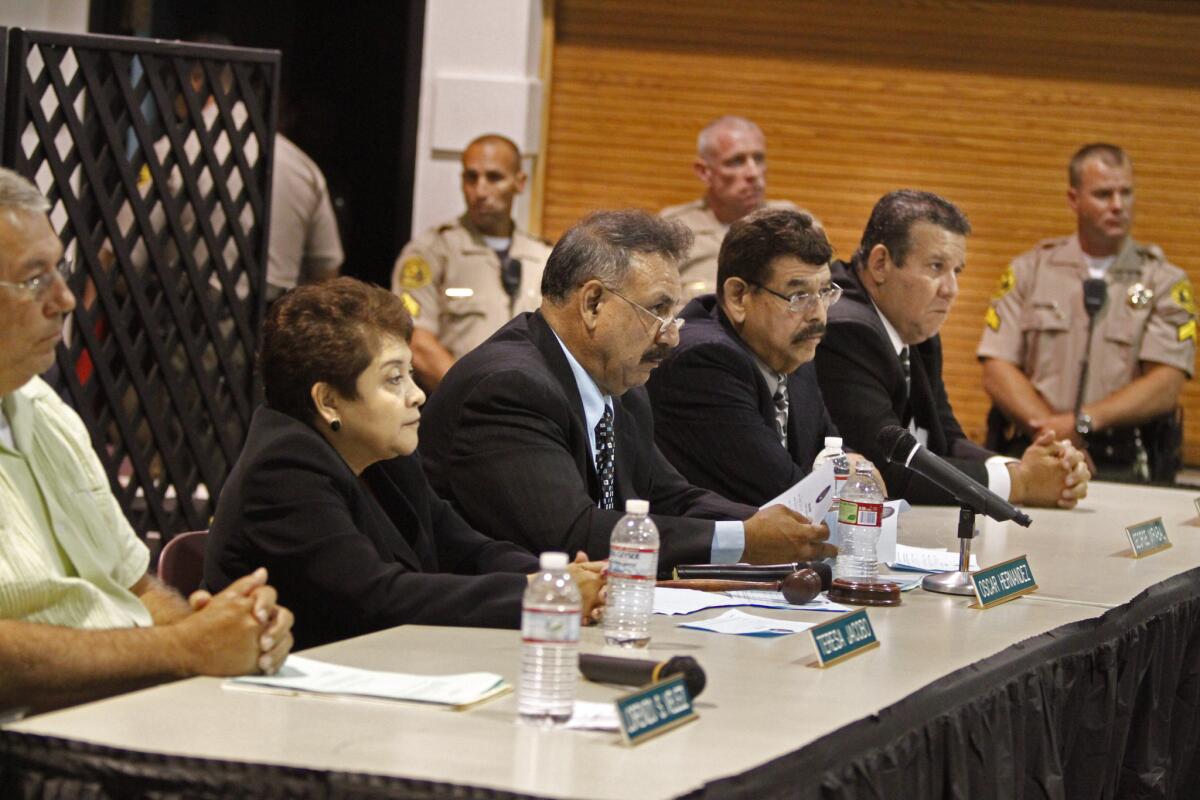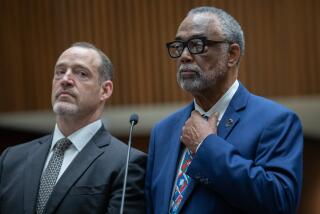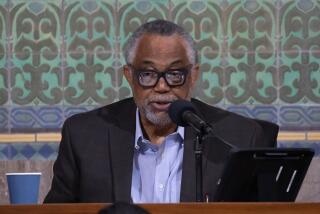Bell council was paid for boards that seldom met

Bell council members earned tens of thousands of dollars over the last four years as members of city commissions that rarely met, records reviewed by The Times show.
Bell’s Surplus Property Authority, for example, met once between January 2007 and July 2010, according to city minutes. The Public Finance Authority met only three times during that period. The Housing Authority met four times in 2008. And the Solid Waste and Recycling Authority has not met since January 2005.
The findings add a new twist to the Bell salary scandal, which has sparked several investigations and prompted the resignations of three top city administrators. Until they cut their pay last month amid public outcry, the council members were earning about $97,000 a year, making them among the highest-paid part-time council members in California.
FULL COVERAGE: High salaries stir outrage in Bell
Under Bell’s salary system, council members received only a modest sum for attending City Council meetings, $150 a month, and $60 a month for sitting on the Redevelopment Agency. What pushed their income so high was the $1,574.65 monthly they received last year for sitting on each of the other five boards, according to records.
In other cases, the boards met, but only briefly. In recent years, the Bell council routinely held board meetings concurrently with council meetings, a move that former City Manager Robert Rizzo said was made in the name of efficiency but that experts in municipal government say is legally problematic.
Take the meeting of July 31, 2006. The Planning Commission met from 8 p.m to 8:03 p.m. The Redevelopment Agency followed from 8:03 to 8:04, the Surplus Property Authority from 8:05 to 8:06, the Housing Authority from 8:06 to 8:07 and the Public Finance Authority from 8:07 to 8:08.
David Demerjian, head of the Los Angeles County district attorney’s Public Integrity Division, said it is illegal for council members to be paid for meetings that don’t take place or that last just a few minutes. He said his office is investigating Bell’s practices.
“They got paid monthly for being board and commission members,” he said. “These other boards and commissions are designed for self-enrichment.”
The Times’ review of city meeting records showed numerous instances when meetings lasted only a few minutes, with no substantial business discussed. On at least three occasions -- June 1, 2009, Feb. 4, 2008, and Jan. 6, 2006 -- the redevelopment agency met for a minute, according to the records.
Through the first half of 2010, the Housing Authority, City Council and Redevelopment Agency have each met seven times. During this period, the Surplus Property Authority, Planning Commission and Solid Waste Authority never met.
In 2009, the Redevelopment Agency met 13 times, the Planning Commission three times, and the Housing Authority five times. The finance, surplus property and solid waste commissions never met.
City compensation records show that the council members received payment each month for being members of the five boards. Last year, according to the records, council members received roughly $8,000 a month for the meetings. That monthly sum had been growing in the last few years: They earned $6,833 in 2007 and $7,666 in 2008.
When asked about the meetings, Councilman Luis Artiga said he assumed his pay was just for the City Council.
“In my mind, it was the same meeting. I didn’t think we were being paid differently for being on one board or another,” Artiga said.
Councilwoman Teresa Jacobo also said she was surprised to hear that she was being paid for being a member of the boards. “We didn’t know we were getting paid for those boards,” she said.
Other council members did not return calls seeking comment. (For reasons that are unclear, one council member, Lorenzo Velez, received only a fraction of the salary the other four earned.)
Patrick Whitnell, general counsel for the League of California Cities, said he had not heard of another city council running together meetings of the council and boards in the manner of Bell. Other cities have separate agendas for each board, as well as clearly marked minutes.
He said minutes need to reflect which agency is taking action and that someone could challenge actions by asking under which authority they were taken.
“The way you describe is not the way I would advise a client to do it,” Whitnell said. “You’re asking for trouble to occur, especially when approving bonds or things having to do with redevelopment.”
Bell is at the center of several investigations into the pay scandal, which was sparked in June when The Times revealed that Rizzo was earning nearly $800,000 a year (a later story found that he actually earned more than $1.5 million when benefits and other forms of compensation were added).
Bell council members were able to go around state limits on council salaries that were set by law in 2005 by holding a special election later that year.
Fewer than 400 people voted in the election, which made Bell a charter city and thereby exempted it from the salary limits. Council members had promoted the change to voters as a way to give the city more local control.
In the years since that election, council salaries had jumped more than 50%, from $61,192 in 2005 to about $97,000 this year, before the controversy forced the council to cut its pay 90%.
State law for “general law” cities, which included Bell before the 2005 special election, limits council pay for a city of Bell’s size to $400 a month and limits council pay for sitting on boards and commissions to $150 a month for each board.
More to Read
Start your day right
Sign up for Essential California for news, features and recommendations from the L.A. Times and beyond in your inbox six days a week.
You may occasionally receive promotional content from the Los Angeles Times.









